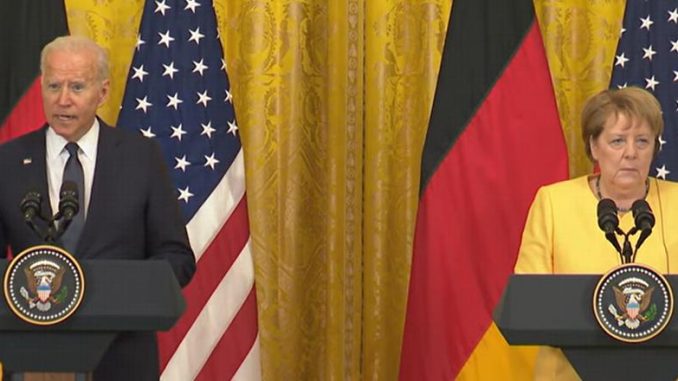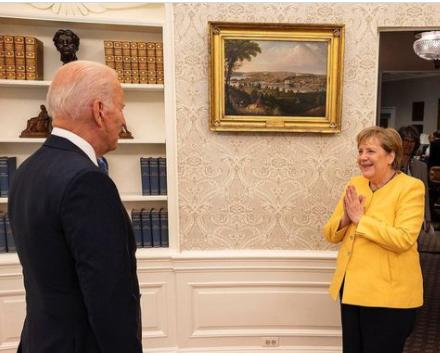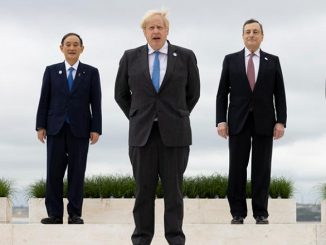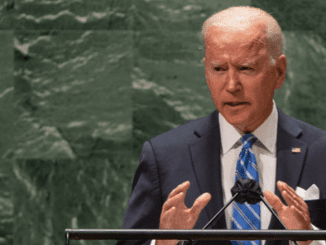
WASHINGTON, DC, July 15, 2021 (ENS) – President Joe Biden and German Chancellor Angela Merkel today at the White House launched the U.S.-Germany Climate and Energy Partnership during Merkel’s farewell visit to the United States as chancellor ahead of Germany’s September elections, in which she is not running.
“As part of our ongoing work together on addressing the threat of climate change, this partnership will strengthen climate ambition and deepen our collaboration on the policies and sustainable technologies needed to accelerate the global net-zero future,” the two leaders agreed.
Both countries are committed to achieving the goals of the Paris Agreement and taking decisive action in this decade to keep a 1.5-degree Celsius temperature limit within reach.
“We share the goals of leading the world to develop the innovative tools urgently needed to accelerate global climate action and achieve net-zero greenhouse gas emissions in their economies by 2050 at the latest,” President Biden and Chancellor Merkel jointly said.
The United States and Germany will invest in a sustainable economy that drives inclusive growth, supports communities, and creates good jobs and a healthy environment on both sides of the Atlantic and beyond, the leaders said.
The Climate and Energy Partnership will be co-chaired from the U.S. side by the Special Presidential Envoy for Climate John Kerry and the Secretary of Energy Jennifer Granholm, and from the German side by the Minister for Economic Affairs and Energy Peter Altmaier, and the Minister for the Environment, Nature Conservation and Nuclear Safety Svenja Schulze.
The U.S. Department of State, Germany’s Ministry of Foreign Affairs, and other agencies or ministries will participate as appropriate.
The United States and Germany intend their new partnership to cover three key areas of cooperation, the two leaders said today – climate action, transformational energy technologies, and energy transitions in emerging economies.
In the climate action arena, the United States and Germany agreed to push to raise global climate ambition and work bilaterally and multilaterally to accelerate reaching a net-zero future.
“We will develop actionable roadmaps and policies for near-term and long-term reduction of emissions to keep a 1.5-degree Celsius limit in sight,” Biden and Merkel agreed.
They will:
* – coordinate on climate and trade agendas;
* – mobilize finance for sustainable development;
* – advance sectoral decarbonization and address short-lived climate pollutants;
* – coordinate on common interests in multilateral fora including the Conference of the Parties of the UN Framework Convention on Climate Change, and the climate tracks in the G20, and G7.
The United States and Germany will collaborate on developing and deploying critical energy technologies.

They agreed to:
* – advance renewable energy technologies and grid integration of variable renewable energy including through energy storage;
* – collaborate on sustainable hydrogen technologies;
* – cooperate on efficiency measures across the building and industrial sectors;
* – increase the adoption of electric vehicles;
* -promote technology commercialization from research institutions to industry;
* -advance reliable and resilient energy systems and supply chains;
* -cooperate on advanced sustainable energy systems while promoting inclusivity, supporting communities, and strengthening the workforce;
* – coordinate in multilateral energy fora including the energy tracks in the G20 and G7, Mission Innovation, Clean Energy Ministerial, International Energy Agency, and the International Renewable Energy Agency, IRENA.
As for energy transitions in emerging economies, the United States and Germany will collaborate to accelerate sustainable energy in emerging economies critical to tackling the climate crisis and preventing the use of energy as a coercive tool.
They agreed to:
* – mobilize investment in Central and Eastern Europe, including by supporting Ukraine’s energy transformation, energy efficiency, and energy security;
* – mobilize investment in sustainable energy in major and growing emitters around the world such as those in South and Southeast Asia;
* – develop energy policy and regulations for increased adoption of renewables and sustainable fuel alternatives like sustainable hydrogen;
* – pursue technology and technical assistance collaboration with major emerging economies to speed decisive action to curb emissions this decade and enable swift net-zero transitions.
In addition to the climate agreement, President Biden and Chancellor Merkel Thursday signed the broader Washington Declaration pledging cooperation to further an open, democratic world. “The foundation of our relationship is a shared commitment to democratic principles, values, and institutions,” the two leaders declared.
Along with the U.S.-Germany Climate and Energy Partnership, they created two more new forums for bilateral collaboration.
“As a lasting demonstration of our bilateral relationship and our commitment to the above principles, we are launching a U.S.-German Futures Forum that will fully utilize the expertise and innovative power of our societies and recommend solutions to jointly shape our future,” they stated. “To facilitate cooperation on crucial economic issues, we will also establish a U.S.-German Economic Dialogue.”
Featured image: Chancellor Angela Merkel and President Joe Biden answer questions from the press at a joint news conference announcing the results of their meeting, July 15, 2021 (Screengrab from video of the news conference courtesy The White House)



